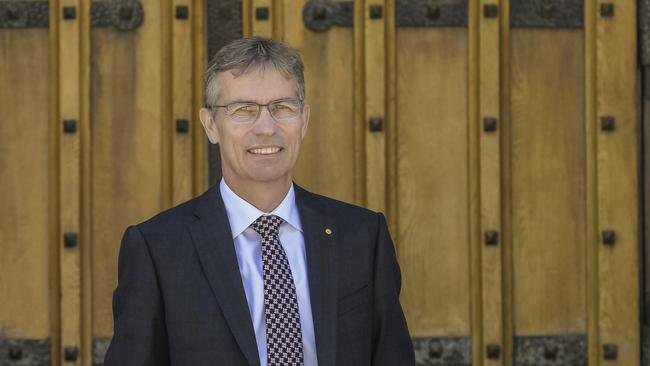Jobs at Adelaide Uni face axe as Covid-19 cuts off international student revenue
Adelaide University is set to axe more than 130 admin jobs, and an unknown number of academic roles, after Covid ravaged international student numbers and revenue.
Education
Don't miss out on the headlines from Education. Followed categories will be added to My News.
Big cuts to jobs and courses loom at Adelaide University as Covid-19 effects constrict revenue.
More than 130 administrative staff plus an undetermined number of academic jobs are at risk although no final decisions have been made.
The university faces a $22 million shortfall this year, growing to a $47 million shortfall in 2023 unless it takes action, vice-chancellor Peter Hoj told staff on Thursday.
“My message to staff was one I found difficult and sad to deliver, and for many it will not have been easy to hear, particularly so shortly after the measures our university took in 2020 with strong co-operation from staff,” he said.
“Unfortunately, the continuing impact of Covid-19 on the sector’s future revenue from international students makes it critical for our university’s students and staff – and for the state – that we address our looming financial shortfall to ensure our institution’s future sustainability.”
The university, which supports 3900 full-time equivalent jobs, needs to cut its costs by $30 million and find an extra $20 million in new revenue.

Proposed actions include:
● Reducing the number of faculties from five to three.
● Closing underperforming programs and courses.
● Reviewing the academic workforce with an understanding of “staff activity relative to revenue generation in a new funding environment”.
● Driving an increase in philanthropy.
Last year, as the first impacts of Covid-19 travel and other restrictions hit the uni, staff agreed to take unpaid leave and forgo some wage entitlements to save the jobs of colleagues. Voluntary redundancies were accepted by 157 staff and the uni paused spending on infrastructure, travel and other projects.
These measures saved some $90 million and, boosted by increased research funding, the uni delivered a surplus of $41 million although its operating surplus was only $9 million on revenue of $977 million.
Prof Hoj, along with university leaders around the country, have warned that the ongoing travel bans have reduced the intake of international students, severely cutting revenue.
SA has federal approval to begin bringing in international students but the numbers will be limited, logistics are not finalised and the go ahead depends on domestic borders being open first.
National Tertiary Education Union branch president Nick Warner said “it would be an understatement to say staff are disappointed” after sacrifices made last year.
Staff appreciated the uni being upfront and being committed to consultation, but “blame for this terrible predicament” lay with the federal government for funding cuts and denial of JobKeeper.
SRC president Oscar Ong said it would be important “to preserve the resources available to students” for both academic and personal support services such as mental health.
The university currently has five academic faculties – arts; engineering, computer and mathematical sciences; health and medical sciences; the professions; and sciences.
A 2016 proposal to merge faculties was rejected by staff.
That would have seen arts merge with the professions which includes disciplines such as law and economics.
The engineering, computer and mathematical sciences would have merged with sciences which includes physical, biological, animal and agricultural disciplines.
The university said consultations would be conducted over July and August with formal processes under enterprise agreements to begin in mid-September.


